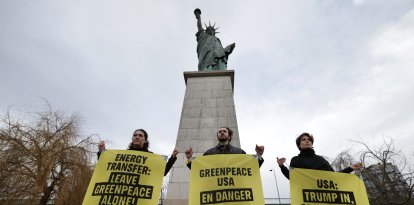Yale hid millions of dollars it received from Qatar, report reveals
The university violated the law by reporting less than $300,000 of the nearly $16 million sent by the Arab country between 2012 and 2023, within the framework of its million-dollar program to promote its interests in the United States.

(Archivo / Wikimedia)
The Institute for the Study of Global Antisemitism and Politics (ISGAP) published a new report on Wednesday revealing that Yale University violated U.S. law by failing to report millions of dollars it received from Qatar between the years 2012 and 2023.
The report, titled “The Ongoing Failure to Report: Yale University, Qatar, and Undisclosed Foreign Funding, Volume Two,” is a new publication from ISGAP's Follow the Money project.
In 2023, the first volume of the investigation revealed that several universities, including Yale, were not adequately reporting donations received, which led to federal investigations in 2019.
According to the new research, Yale University reported receiving $248,668 from Qatar between 2012 and 2023. However, it is estimated that the Arab country donated at least $15,925,711 to the institution.
This withholding of information violates federal law and raises serious concerns about the transparency of American universities. Under Section 117 of the Higher Education Act of 1965 (HEA), academic institutions must report semiannually on all foreign gifts and contracts exceeding $250,000.
ISGAP stressed that the lack of transparency contributes to the erosion of academic integrity and calls for oversight of the matter, especially in light of the increase in antisemitic incidents at American universities, particularly at Yale.
Antisemitic incidents are more frequent at universities that receive money from Qatar
Dr. Charles Asher Small, executive director of ISGAP, said that despite investigations and warnings, Yale and other universities continue to engage in practices that violate federal law, which not only undermine transparency and accountability, but also pose significant risks to the integrity of higher education.
Small added that antisemitic incidents are more frequent on campuses that receive funding from Qatar, compared to universities that do not receive funding from that country.
ISGAP also called on the U.S. Department of Education to step up oversight and ensure that all universities fully comply with federal funding disclosure laws.
Qatar seeks to promote its interests in the United States
ISGAP added in its report that with these types of contributions, Qatar aims to exert influence and promote its interests in the United States. This situation is reflected in the relationship between Yale University and the Arab country, since there are numerous transactions that do not appear in the financial statements of the institution or in the reporting system of the United States Department of Education.
In a recently published article, Voz Media pointed out that the success of the despicable antisemitic and pro-Hamas demonstrations at U.S. universities is related to the fact that they are not spontaneous at all, but are well organized and financed from abroad.
Researcher Dr. Yaron Friedman argued in an article published in Israeli newspaper Maariv that to reveal who is behind the protests, it is necessary to go back to 2019, when a coalition of Arab countries composed of Saudi Arabia, the United Arab Emirates, Bahrain and Egypt boycotted Qatar for its support of terrorism.
Unlike what is currently happening, during the period of the boycott of Qatar, Arab commentators and journalists published articles that exposed the country’s propaganda in the United States and the money that Qataris invested in the American educational system.
Friedman recalled that in July 2020, Emirati researcher Najat Al Saied published an article in Alhurra titled “Qatar and the Financing of American Universities.” In the piece, the academic described the strange alliance formed between the American radical left and Muslim Brotherhood activists in Qatar. Furthermore, she noted that more and more professors and students who were part of that alliance were taking over freedom of thought on American universities.
Dr. Al Saied argued that under the pretext of "political correctness" and supposed "racist thinking," academics who tried to express an opinion that was different from that of the professors and students who were part of the alliance of the radical left and Islam were condemned. In her writing, the researcher mentioned shocking data from the United States Ministry of Education, according to which in 2019 American educational institutions received more than $1 billion in external financing, much of it from Qatar.
In 2012, Qatar Foundation, Qatar’s international education institution, spent at least $1.5 billion to fund educational initiatives at 28 universities across the United States and became the largest external financier of education in America. Al Saied further revealed that the country regularly spent $405 million per year to fund activities at six American universities that have branches in Doha, the Qatari capital.
Friedman stressed in her article that, of course, this is not a gift, since Qatar uses the activities it promotes and the research it funds to spread its Islamist ideology. The researcher added that it is a country based on an extremist Wahhabi doctrine and that Sheikh Tamim bin Hamad al-Thani, current emir of Qatar, was deeply influenced by the ideology of Sheikh Yusuf al-Qaradawi, one of the leaders of the Muslim Brotherhood who worked in Qatar until his death in 2022.
Al Saied stated in her article that Qatari propaganda aimed to glorify the principality and defame its rivals, mainly Saudi Arabia, Egypt, the United Arab Emirates and Bahrain. She further added that the money from Qatar was intended to finance the Muslim Brotherhood in the United States and the radical left in that country.
The academic also argued that Qatar strengthened American progressives because conservatives opposed Doha and supported its rivals, including Saudi Arabia.
According to a report by The Washington Free Beacon, Qatar has invested $5.6 billion in 81 American universities since 2007, including the most prestigious: Harvard, Yale, Cornell and Stanford.
The report also made reference to the financing of academic activities by other countries, such as Saudi Arabia, Oman and Turkey, although in significantly smaller amounts. According to the report, these activities funded by Qatar and these other Middle Eastern countries promote hatred towards Western cultural values, such as freedom of speech and women's rights.
According to a 2020 report from the United States Department of Education, many of the donations given to American academic institutions were granted by nations openly hostile to the U.S.
The Washington Free Beacon report further indicated that Middle Eastern donors, especially Qatar, were funding anti-Israel activities even before the war in Gaza began following the Oct. 7 massacre by Hamas.























